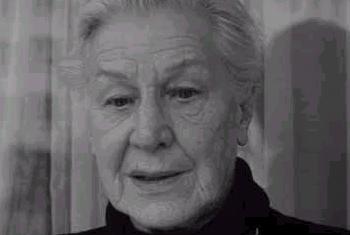“That can really only happen when a tyrannical system is so well established that it can dominate the entire fabric of society. And the Germans are good at organising. People’s consciences, too.”
When does something qualify as cinema? What differentiates visual recording from actual filmmaking? If your uncle shoots you and your little buddies playing Ultimate in the park, is that a movie? What about the security camera behind the counter at the dépanneur, if you edit 85 minutes of footage and release it, is that a film? And what if you sat down an 80 year old German woman in front of a camera and had her talk about her life? No archival footage, no reenactments, no musical montage, no other talking heads offering their different points of view, just static shots of the one woman being interviewed. Is this really cinema?
“Blind Spot: Hitler’s Secretary” is interesting and worth seeing, I’m just not sure why it’s being released in theaters when it’s more like a news show segment (“Tonight on 60 Minutes…”) than what I consider a film. Is it because the people who set up the interview have directed documentaries before? Or is it because this is, as Vanity Fair puts it, such “an amazing scoop” that it must be seen on the big screen?
Traudl Junge was a pretty young girl who wanted to be a dancer, barely concerned with the rise of National Socialism around her. She never expected to find herself working as one of the Fuhrer’s private secretaries, but she ended up taking dictation from him through the later years of World War II until mere days before he took his own life. Hers is certainly a tale worth hearing, or I should say ‘reading’: unless you speak German, expect to spend 85 minutes reading non-stop subtitles.
Through the “film” we get a different image of Adolf Hitler than that of the angry madman yelling and spitting hate to the masses. In everyday life, this “great man” (Junge’s words) was friendly, acting like a typical boss but also like a father figure. He was clueless about women but he loved his dog very much and dead flowers made him sad. It’s chilling to hear these things, as it confirms that Hitler wasn’t a monster or an exceptional mistake in nature, he was only human. An evil megalomaniac, but still human.
The most fascinating part of the interview is when Junge recounts the last weeks of the Nazi regime when Hitler and his closest advisors hid in his fortified bunker, discussing the best ways of killing themselves but also finding the time to celebrate not one but two marriages, including Hitler’s union to Eva Braun “to the thunder of the Russian artillery”. Junge even took dictation of Hitler’s “political testament”, in which he blamed the Jews and the lack of will of the German people…
The saddest thing we get hear might be how Junge herself deals with her guilt. She tries to find excuses (“I was young”, “naïve”, “I didn’t know what was going on”, “everyone did it”…), but you can see that she knows that there had to be other ways and that she hates herself for it. She died just hours after “Blind Spot” had its world premiere at the Berlin Film Festival.
“I have finally let go of my story. Now I feel the world is letting go of me.”

